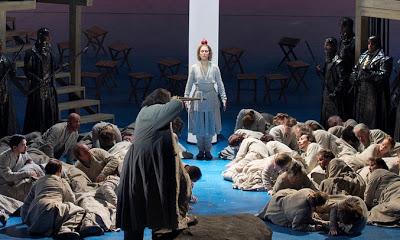by Paul J. Pelkonen

A climactic moment from Act III of Guillaume Tell.
Photo by Ruth Walz for the Dutch National Opera. © 2016 The Metropolitan Opera.
What is Guillaume Tell?
This four act opera by Rossini, which tells of the Swiss rebellion against the oppressive forces of their Austrian rulers, and of folk hero William Tell's fortitude when forced to shoot an apple (with a crossbow) that is balanced on his son's head. It is a rousing good time filled with some of this most tuneful composer's best writing for orchestra and voice. Tell is a grand opera, as long as a Wagner music drama but infinitely more entertaining.
Who's in the cast?
This extravagant show features a rock-solid cast with Gerald Finley, Bryan Hymel and Marina Rebeka (who sang the premiere of this production in the Netherlands in 2013) leading the Swiss struggle for freedom against their Austrian oppressors. These singers face vocal challenges as steep as the Swiss Alps themselves, including an Act IV aria for the tenor that demands six perfect high C's. The supporting players include bass John Relyea as the evil Gessler and Janai Brugger as Tell's son Jemmy. Fabio Luisi conducts.
Why should I go see this opera?
Despite its great historic importance, this opera is better known as the source material for the "Lone Ranger" theme than for its arias, choruses and ensembles, many of which rank as the most beautiful Rossini ever wrote. And yet, a listen to its score reveals a cornucopia of gorgeous music, that stays with the ear long after you leave the theater. It is an unforgettable work.
How's the production?
This Pierre Audi staging bowed in the Netherlands in 2013 to generally positive reviews. He summons up a grim landscape, combining the mists and gloom of that country's lake regions with wooden "guard towers" that symbolize both the Austrian governor's forces and the Alps themselves. There's plenty of merrymaking, and armed thugs to make sure the peasants dance, sing and have a good time, at least until they rebel and throw off their chains (somewhere in the second act.)
When does the show open?
Guillaume Tell opens Oct. 18 and runs until November 12. Note that all evening performances start at 6:30pm. The MET Live in HD broadcast will be Oct. 29 at 12pm.
Where do I get tickets?
Tickets are available through MetOpera.Org or by calling the box office at (212) 362-6000. You can save service fees by going to the box office in person at the Met itself, located at 30 Lincoln Center Plaza. Hours: Monday to Saturday: 10am-8pm, Sunday: 12pm-6pm. Rush tickets are available on the Met website, day-of-show only.
Which recording should I buy?
Due to its length, complexity and steep demands on the singers there are few recommendable recordings of William Tell in the catalog. And they are...
Royal Orchestra and Chorus of Covent Garden cond. Lamberto Gardelli (EMI, 1973)
This set is what got me into this opera so deep, with Lamberto Gardelli's sure and steady hand leading a fine cast. Gabriel Bacquier is noble as Tell. Nicolai Gedda sings what might be his best recorded performance as Arnold, and Montserrat Caballe is free to unleash floods of beautiful tone as Mathilde. Sung in the original French, as all later Rossini operas should be.
National Philharmonic Orchestra cond. Riccardo Chailly (Decca, 1979)
This has an unbeatable cast, with Sherrill Milnes firm and resonant in the title role, Luciano Pavarotti giving his all (something that didn't always happen with the great tenor) in the lung-busting role of Arnold, and Mirella Freni glorious as Mathilde. The young Riccardo Chailly whips up an enthusiastic performance The only hitch is: it's in Italian. But hey, it's Rossini.

